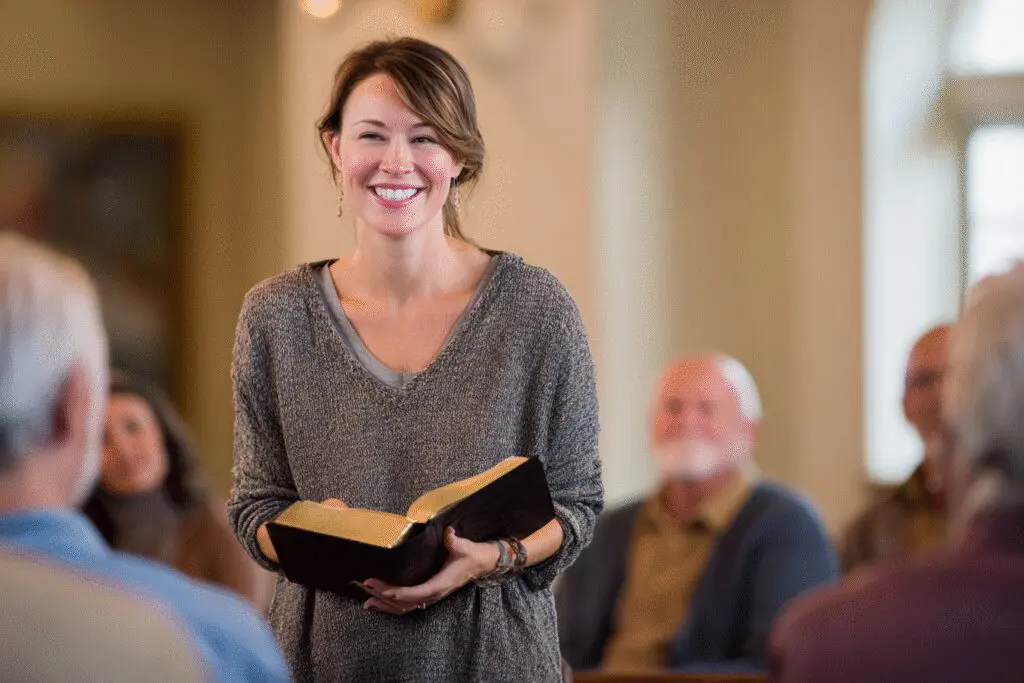Have you ever felt a nudge to lead? Maybe it was a quiet whisper. A thought that you could do more. You want to help others grow in their faith. But a big question stops you. How do you lead a Bible study? It feels like a huge task. You might feel unqualified. You might feel scared. I understand that feeling completely. I have been there. The good news is God does not call the qualified. He qualifies the called. Learning how to lead a Bible study is a journey.
It is a process of trusting God. It is about loving people. This guide will help you. We will walk through it step by step. You can become an amazing teacher. You can lead a group that changes lives. It starts with a willing heart and a first step.
More in Bible Category
How to Read the Bible for Beginners
What Bible Should I Read as a Beginner
Key Takeaways
- Your Heart is Key: Leading well starts with your own relationship with God. It is about humility and serving others. Your character is more important than your knowledge.
- Prayer is Your Best Tool: Pray for your group members by name. Ask the Holy Spirit for wisdom and guidance. Depend on Him completely.
- Good Questions are Everything: Learn to ask open-ended questions. These questions spark real discussion. They help people discover truth for themselves.
- You Are a Guide, Not a Lecturer: Your job is to facilitate a conversation. You guide people through the scripture. You are not there to give a sermon.
- Create a Safe Space: People share when they feel safe. A welcoming and gracious group is essential. Vulnerability starts with you.
What is the Real Goal of a Bible Study Leader?
We often think leading is about having all the answers. That is a common mistake. The real goal is much different. Your primary job is to point people to Jesus. You are a guide. You help people see God in His Word. You help them apply it to their lives. It is not about impressing anyone. It is about serving them.
A successful Bible study is not one where you talk the most. It is one where people connect with God. It is where they connect with each other. You are there to make that happen. Think of yourself as a host. You are creating a space for God to work. This mindset changes everything. It takes the pressure off you. It puts the focus on Him.
Why Your Heart Posture Matters More Than Your Knowledge
You could have a seminary degree. You could know Greek and Hebrew. But if your heart is not right, your leadership will be empty. People do not connect with knowledge alone. They connect with a genuine heart. They are drawn to a leader who loves Jesus. They follow someone who is humble and real.
Your group needs to see your love for God. They need to see your love for them. This is more attractive than a perfect lesson plan. God uses leaders who depend on Him. He works through those who are willing to be small so He can be big. So, focus on your heart first. Spend time with God. Let Him shape your character. This is the foundation for everything else.
How Do I Prepare My Heart to Lead?
Heart preparation is an active process. It is not something that just happens. You must be intentional about it. Here are some simple ways to prepare your heart.
- Pray Daily for Your Group: Pray for each member by name. Ask God to give you His heart for them. Pray for their needs and their spiritual growth.
- Confess Your Own Sin: We all fall short. Come before God with a humble heart. Confess your sins. This keeps you dependent on His grace.
- Be in the Word for Yourself: Do not just study to teach. Read the Bible for your own soul. Let God speak to you first. Your teaching will flow from a full cup.
- Serve With Humility: Look for ways to serve your group. Your actions show your heart. Be the first to arrive. Be the last to leave.
How Do You Actually Prepare for a Bible Study Session?
Practical preparation is also very important. A well-prepared lesson helps you lead with confidence. It allows you to focus on the people. You are not worried about what to say next. I have found a simple rhythm that works. It is not about spending endless hours. It is about using your time wisely.
Your goal is to understand the passage deeply. Then you can create questions to help others understand it. Do not feel like you need to be an expert. You are a fellow learner. You are just a few steps ahead on the path. Give yourself grace in the process.
Choosing the Right Scripture or Topic
First, you need to decide what to study. This is a big decision. It sets the direction for your group. Pray about it. Ask for God’s guidance. Consider what your group needs most right now. Here are a few common approaches.
- Study a Book of the Bible: This is often the best way. You go through a book chapter by chapter. This allows the context to guide your study.
- Do a Topical Study: You can study a topic like prayer, forgiveness, or marriage. You look at different verses from all over the Bible.
- Focus on a Character: You can study the life of a person like David, Esther, or Peter. This can be very relatable and inspiring.
Whatever you choose, commit to it for a season. This helps build momentum and deeper understanding.
What Does Good Bible Study Look Like on Paper?
A great method for study is Observation, Interpretation, and Application. I use this every single time. It is simple and powerful. It keeps you focused on the text.
1. Observation: What does the passage say? This is the first and most important step. You simply observe the facts of the text. Do not jump to conclusions yet.
- Who are the people?
- What is the setting?
- Are there repeated words or ideas?
- What is the main point of each paragraph?
2. Interpretation: What does the passage mean? Now you can start asking what it means. You are trying to find the author’s original intent.
- What did this mean to the first audience?
- How does this fit with the rest of the book?
- How does it fit with the whole Bible?
- What does this teach me about God?
3. Application: How does this passage apply to my life? This is where the truth connects with our lives. The goal is life change, not just more knowledge.
- How should this change the way I think?
- How should this change the way I feel?
- What should I do in response to this truth?
- Is there a specific action I need to take?
How Much Time Should I Spend Preparing?
This is a question I get all the time. There is no magic number. I have spent ten hours on a study. I have also spent just one hour. The key is not the clock. The key is the condition of your heart and your focus.
Do not get caught in the trap of comparison. Your preparation is between you and God. Give Him your best. Some weeks you will have more time. Other weeks you will have less. That is okay. A simple, well-prayed-over plan is better than a complex one you are not ready for. God will use your faithful effort. He can do amazing things with your five loaves and two fish.
How Can I Ask Questions That People Actually Answer?
This is the secret sauce of a great Bible study. Good questions make the difference. They turn a lecture into a discussion. They invite people to engage. They help people discover truth for themselves. This is far more powerful than just telling them.
Many leaders are afraid to ask questions. They fear the silence. What if no one answers? That is a real fear. But it is a fear worth facing. Learning to ask good questions is a skill. You can learn it. It just takes practice and intention. Your group will thank you for it.
The Difference Between Open and Closed Questions
The most important thing is to ask open questions. A closed question can be answered with “yes” or “no”. An open question requires a real thought and a longer answer.
- Closed Question: “Did David trust God in this chapter?” (Answer: Yes)
- Open Question: “How did David’s trust in God show itself in this chapter?”
See the difference? The open question invites a story. It invites reflection. It creates conversation. Your goal is to fill your study with open-ended questions. Avoid the closed ones whenever you can.
Can You Give Me Examples of Great Bible Study Questions?
Of course. It helps to have some question stems in your back pocket. You can adapt these to almost any passage. Here are some of my favorites.
- What stands out to you in these verses?
- What does this passage teach us about God’s character?
- How does this challenge a common way of thinking?
- Where do you see the gospel in this story?
- Why do you think the author included this detail?
- If we really believed this, what would change in our lives this week?
- What part of this is confusing or hard to understand?
Notice how these questions do not have one right answer. They invite personal reflection and group discovery.
What if I Ask a Question and No One Answers?
I have been there. The silence can be deafening. Your heart starts to pound. Do not panic. The silence is not always a bad thing. People may just be thinking. Here is what you can do.
First, wait. Just count to ten in your head. Give people a moment to process. Someone will often break the silence if you just wait.
Second, rephrase the question. Maybe they did not understand it. Try asking it in a different way. Make it simpler.
Third, answer it yourself. You can model the kind of answer you are looking for. Say something like, “For me, what stood out was…” This can get the ball rolling.
What is My Role During the Actual Bible Study?
You have prepared your heart and your lesson. Now it is time for the meeting. Your role shifts now. You are no longer a student. You are now a facilitator. You are a guide. You are the conductor of the orchestra, not the soloist.
Your energy and attitude will set the tone for the group. Be warm. Be welcoming. Show that you are excited to be there. Your main job is to manage the conversation. You want to make sure it is balanced, helpful, and focused on the scripture. This requires you to listen more than you talk.
How to Start the Bible Study Meeting
How you start is very important. The first few minutes set the tone for the whole meeting. You want people to feel comfortable and ready to engage. A good start makes everything else easier.
I suggest a simple three-part beginning.
- Welcome: Start on time. Greet everyone warmly. Thank them for coming.
- Icebreaker: Ask a simple, non-threatening question to get people talking. It could be, “What was the best part of your week?” This helps people transition into group mode.
- Opening Prayer: Pray and ask the Holy Spirit to guide your time. Ask Him to open your hearts to His Word.
How Do You Handle Someone Who Talks Too Much?
In almost every group, there is one person who loves to talk. We are thankful for their passion. But they can dominate the conversation. This can prevent others from sharing. Handling this requires grace and courage.
Do not embarrass them publicly. Talk to them in private if it is a recurring issue. During the study, you can use gentle redirection.
- “That is a great point, Mark. Thank you for sharing. I would love to hear what someone else thinks about that.”
- “I appreciate your passion for this. To make sure we get through our study, let’s move to the next question for now.”
Your job is to protect the group dynamic. That means ensuring one voice does not drown out the others.
What About the Person Who Never Talks?
Just as common is the person who is very quiet. They may be shy or introverted. They may be processing internally. We want to include them without putting them on the spot. Never call on them directly if they are not comfortable.
Instead, create opportunities for them to share.
- You can break into smaller groups of two or three. This is often less intimidating.
- You can ask a question that everyone answers. For example, “In one word, what are you taking away from this?”
- You can personally affirm them after the meeting. “I really appreciate you being here. Your presence matters.”
How Do I Keep the Conversation on Track?
Sometimes discussions can go way off topic. A simple question can lead down a rabbit hole. This can be frustrating. You have a limited amount of time. You want to honor the scripture you prepared.
It is okay to gently guide the conversation back.
- “That is a really interesting topic. Maybe we can discuss that after we finish. For now, let’s get back to verse 10.”
- “I want to make sure we understand this passage. Let’s return to our main point.”
A “parking lot” can be helpful. You can write down off-topic questions on a board. Then you can promise to come back to them later. This validates the person’s question while protecting the study time.
How Can I Make My Group a Place People Want to Be?
The atmosphere of your group matters immensely. Is it a place of grace? Is it safe to be honest? Do people feel seen and loved? A healthy environment is where life change happens. People open up their hearts when they feel secure.
Creating this kind of culture starts with the leader. You set the tone. If you are judgmental, the group will be too. If you are gracious and vulnerable, others will follow your lead. This is one of the most important parts of how to lead a Bible study. It is about building a true community.
Why Vulnerability Starts With the Leader
I once had to lead a study on joy. That week, I was feeling anything but joyful. I was discouraged and tired. I thought about faking it. But I decided to be honest. I told the group, “I am struggling to feel joy this week. So I need this passage as much as any of you.”
It was one of the best meetings we ever had. My honesty gave others permission to be honest too. We had a real conversation. Your group does not need a perfect leader. They need a real one. Share your struggles when it is appropriate. Admit when you do not know an answer. Your vulnerability is a gift to the group. It makes grace real.
Practical Ways to Build Community in Your Group
Community is built through shared experiences. It grows over time with intentional effort. Here are some simple ideas.
- Share Food: There is something powerful about eating together. It breaks down walls.
- Pray for Each Other: Make time to share prayer requests. Follow up on them the next week. This shows you really care.
- Meet Outside the Study: Go to a ballgame. Have a potluck at your house. Serve together on a local project.
- Celebrate Together: Acknowledge birthdays, anniversaries, and answered prayers. Celebrate God’s faithfulness in each other’s lives.
Sometimes conflict happens even in the best groups. Learning how to navigate it in a healthy, biblical way is crucial. Resources from trusted seminaries, like this article on pastoring a small group through conflict, can provide wise guidance for those tough moments.
What’s the Most Important Thing to Remember?
We have covered a lot of ground. We have talked about your heart. We have talked about preparation. We talked about questions and group dynamics. These things are all important. But they are not the most important thing.
The most important thing to remember is this. It is God’s Bible study. It is His Word. They are His people. And it is His Holy Spirit that brings about change. Your job is to be faithful. Your job is to show up. Your job is to lean on Him.
You will make mistakes. You will have awkward moments. You will have studies that feel flat. That is part of the journey. Do not give up. God’s power is made perfect in your weakness. He will use your humble, faithful efforts in ways you may never see. So step out in faith. You can do this. He will be with you.
Frequently Asked Questions – How to Lead a Bible Study

What if I don’t know the answer to a question during the study?
It is okay to admit you don’t know by saying, ‘I don’t know,’ which shows humility and honesty. Follow that by saying you’ll look into the question and discuss it next time, and then make sure to do the research. This demonstrates a love for learning and trust in God’s guidance.
How should I prepare for leading a Bible study session?
Preparation involves prayer, reading the Bible passage multiple times in different translations, exploring the meaning using study notes or commentaries, and planning open-ended questions. This thorough prep helps you lead confidently and keeps the group engaged.
What material should I choose for my first Bible study?
For beginners, start with accessible materials such as the books of Mark or John, short letters like Philippians or Colossians, or use pre-made video studies from trusted sources like BibleProject. These options are easier to understand and provide a good foundation.
How can I create a safe and honest environment in my Bible study group?
You can create a safe environment by being open yourself, thanking others for their ideas, and gently stopping any mean words or gossip. This encourages honesty, allows participants to share their thoughts without fear, and fosters trust in the group.
What is the main mindset I should have when leading a Bible study?
The main mindset is to see yourself as a guide rather than a Bible expert or teacher. Your role is to facilitate discussion by asking good questions and creating a space where participants can discover truths in the Bible for themselves.




